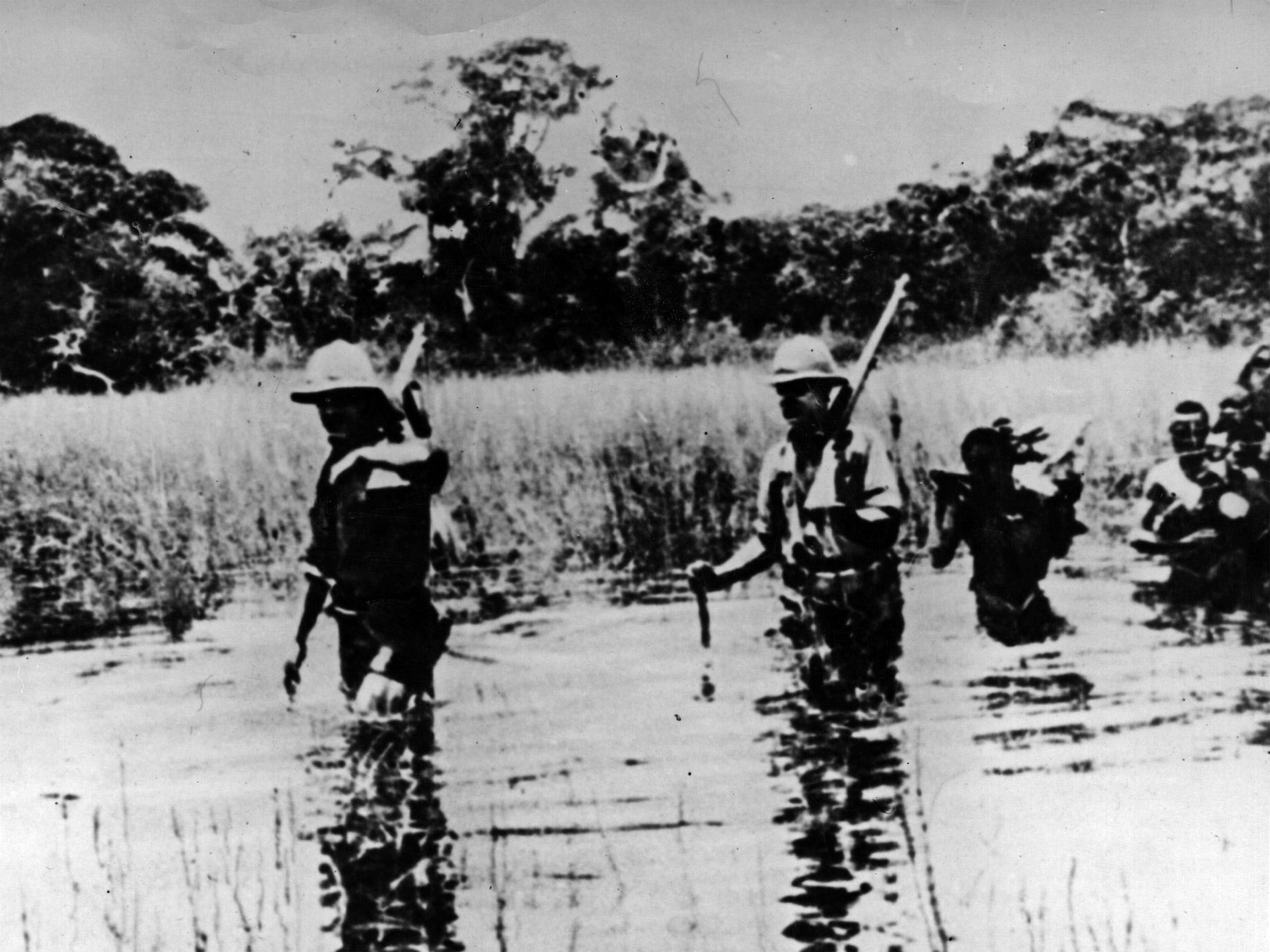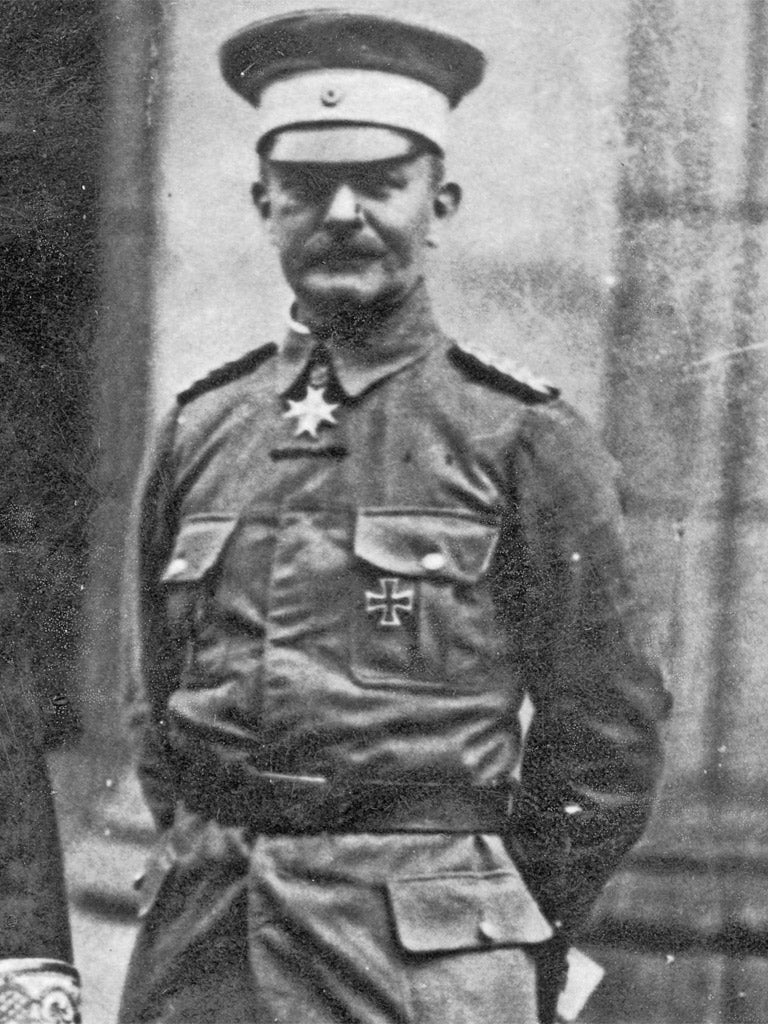A History of the First World War in 100 Moments: Guerrilla in the mist - a great German military maverick outwits the British again
General Paul von Lettow-Vorbeck’s irregulars kept thousands of Allied troops tied down in the east African bush for years. Sean O'Grady reflects on his finest hour

There was only one German general in the First World War who managed to occupy British territory.
Not Hindenburg, Ludendorff, Falkenhayn or any of the more celebrated, or notorious, figures.
The only one who did, albeit a long way away from the Western Front, was Paul Emil von Lettow-Vorbeck, commander of the Germans in their East Africa possessions, Tanganyika (now Tanzania) and present-day Rwanda and Burundi.
It was he who led a remarkable guerrilla war against British, South African, Nigerian, Gambian, Kenyan, Portuguese and Belgian forces in the region, managing to score a series of remarkable successes – and remaining at large when the Armistice arrived in 1918.
Alone among Germany’s overseas possessions, Deutsche Ostafrika never surrendered. Indeed, Lettow-Vorbeck would have a special clause in the Armistice of November 1918 specifically devoted to the arrangements for the safe conduct of himself and his men at the end of the war.
At the outbreak of war, Lettow-Vorbeck had been commander of a small garrison in Tanganyika, which came under British attack at Tanga in November 1914. He denied the British victory on that occasion, and continued to do so, through brilliant guerrilla tactics, for the rest of the war.
When he finally returned to Germany, in March 1919, he was treated as a hero. An old-school soldier, he told Hitler to “get lost” (or stronger) when approached to become ambassador to London in the 1930s; and it is thought he heartily disliked the Nazis.
When Lettow-Vorbeck died in 1964, at the ripe old age of 93, the Federal Republic laid on a formal ceremony, and invited some of his surviving Askari troops to attend the funeral. He’d had a tearful reunion with them in 1953, and, indeed, is remembered for running his army on (relatively) non-racial lines. “We are all Africans,” was reportedly one of his mottos.
Lettow-Vorbeck’s “army” comprised some 14,000 men, at most: 11,000 African Askaris, and about 3,000 Germans, of whom some were “proper” soldiers, others recycled sailors rescued from a scuttled cruiser, the Konigsberg. Cut off even from radio contact with the fatherland, they were left to their own devices. They lived off the land and whatever supplies they managed to capture from their foes – notably the Portuguese, based in Mozambique.
The German/Askari army were pitted against larger forces from the British, Belgian and Portuguese empires, but brilliant soldiering meant that he evaded capture every time.

This, of course, was Lettow-Vorbeck’s great contribution to the Kaiser’s war effort; Tanganyika was not much of a prize in anyone’s book, but it meant that disproportionate imperial allied forces – perhaps 300,000 strong – would be tied down in a fringe theatre, far away from Flanders, where they might have been of more use.
The Battle of Mahiwa – perhaps his most-famous triumph – was in many ways typical. Throughout the latter part of 1917 the British and their allies had, as usual, been chasing this Afro-German pimpernel around south-eastern Tanganyika. Finally, at dawn on 17 October, they thought they had him cornered. A British/Nigerian/Gambian attack force was led by two indifferent British commanders: a Colonel Christopher Tytler and the magnificently named Brigadier-General Henry de Courcy O’Grady (no relation).
Lettow-Vorbeck moved quickly, and fortified a ridge with 1,500 men and a couple of field guns (salvaged from the Konigsberg). By dawn the next day the British had suffered some 2,348 casualties against 519, plus one of the field guns, for the Germans.
More importantly, with the British forced to withdraw, Lettow-Vorbeck was at large again, and continued to tie down British forces for the rest of the war.
As late as September 1918 he led another raid into the then British colony of Northern Rhodesia (now Zambia) and occupied the town of Kasama. Again, it was not much of a prize in itself, but it was a handy symbolic victory at a time when German triumphs were rare indeed.
A few years after the end of the Great War, one of his opponents, Colonel WD Pownes MC of the Royal Sussex Regiment and the Nigeria Regiment, summed up Lettow-Vorbeck thus: “I do not think that in the whole history of the war there has ever been a more striking character than General von Lettow-Vorbeck.
“He was a genius in the art of bush warfare, a man of indomitable spirit – a most remarkable leader of men, who did not know what it was to be beaten. To him discomfort, hunger, heat, shortage of ammunition and supplies were all as nothing.
“He had one object in life only, and that was never to be taken by the British. He has at least earned for himself enduring fame for being a brave man and a worthy enemy.”
General Paul Emil von Lettow-Vorbeck deserves to be better remembered today.
Tomorrow: Hunger in the streets of Berlin
The '100 Moments' already published can be seen at: independent.co.uk/greatwar
Join our commenting forum
Join thought-provoking conversations, follow other Independent readers and see their replies
Comments